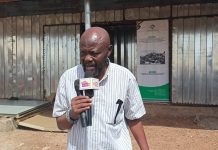Accra, Ghana –August 15, 2024—In a bid to ensure that the transition from fossil fuels to green and renewable energy is both equitable and inclusive, the AbibiNsroma Foundation, in collaboration with the FIDEP Foundation, held a workshop at CENCOR in Dzorwulu, Accra.
The event, titled “Advocating for Social-Inclusive Just Transition: Empowering CSOs with Progressive Rights-Based Tools,” aimed to equip civil society organizations (CSOs) across Ghana with the knowledge and tools needed to advocate for a just transition that benefits all segments of society.
Supported by Milieudefensie (FoE-Netherlands), the workshop emphasized the importance of a Human Rights-Based Approach (HRBA) in driving social justice during this pivotal energy shift.
During the workshop, participants delved into the concept of a just transition from fossil fuels to green and renewable energy, exploring the associated social, economic, and environmental implications.
The event underscored the need for advocacy strategies that promote social inclusiveness within energy transitions, ensuring that marginalized communities are not left behind.
Central to these discussions was the introduction of progressive rights-based tools and frameworks, which participants were trained to utilize in their advocacy efforts.
The workshop also highlighted the six (6) core components of an HRBA,” which are essential for integrating human rights into development, advocacy, and policy initiatives.
Additionally, the workshop made reference to the Climate Action Tracker (CAT) Assessment Framework, Climate Responsive Budgeting with Multi-Stakeholder Budget Reviews, and Progressive Rights-Based Debt Sustainability Assessment as key tools that CSOs can add to their advocacy toolbox.
By focusing on these core components and tools, the workshop aimed to guide CSOs in championing energy transitions that uphold human dignity, equality, and accountability.
Participants were encouraged to develop actionable plans and foster collaboration among themselves to ensure ongoing support and impact.
By the end of the workshop, attendees had gained a comprehensive understanding of the just transition process, equipped with effective advocacy strategies and practical experience in using rights-based tools.
This knowledge positions them to lead the way in advocating for green and renewable energy initiatives that are both sustainable and inclusive, ensuring that every segment of society benefits from this critical transition











































